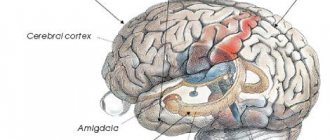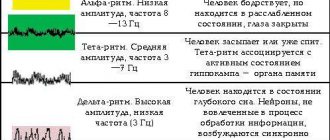As an epigraph, I would like to cite the words of the famous scientist, researcher and popularizer of science Konstantin Vladimirovich Anokhin, who devoted most of his life to studying the phenomenon of the brain:
“The human brain is nature's greatest mystery. Today we know more about the laws of the world around us, the cosmos, the universe, than about ourselves. But if man is created by nature, then we can hope to understand the nature of this phenomenon.”
The main signs of a modern successful person
- high intelligence;
- good memory;
- creativity;
- intuition;
- efficiency;
- the ability to quickly make the right decisions;
- the ability to easily absorb new knowledge.
The psychological functions of the brain are derived from the work of millions of cells. Among the average person who is far from academic science, a superficial judgment has long been strengthened, the essence of which boils down to the statement that the average person uses his brain only 3-5%.
Many people ask the question - how to make the brain work at 100? The answer is not easy to find. The core of the central nervous system is a highly organized structure, which, in addition to cognitive processes (memory, thinking, imagination), is responsible for maintaining life in the human body and regulates all biological processes occurring in it.
It is the brain that makes our heart beat, controls our lungs, and makes us pull our hand away from a hot object at the first sign of pain (thanks to the ability to feel pain, we can hope to live to a ripe old age).
Most of the processes occurring in the head should not be realized, otherwise it can lead to disaster. Epilepsy is a disease that leads to disruption of the brain structure. The brain is unable to control the activity of certain areas, which leads to memory loss and convulsive fainting.
Get enough sleep!
Lack of sufficient sleep literally “drunk” the brain! This is not a joke - it is confirmed by scientific research. Excessive sleepiness affects the transmission of signals between nerve cells, and we begin to experience problems remembering information. In turn, according to researchers from Oxford, lack of sleep leads to the fact that the brain reacts to stimuli with such a delay as in a state of alcohol intoxication. Before an important event where concentration is required, it is best to simply get a good night's sleep.
Deception #3: If you make a mistake, it means you are a failure.
When we hear the name Einstein, we immediately think of his brilliant intellectual feats, which most people believe none of us can accomplish. And this is largely deserved: Einstein did more for the development of scientific thought and, in particular, physics than any other scientist of our time. His discoveries made possible some of the most important modern technologies.
It is easy to assume that, with such an outstanding reputation, Einstein rarely made mistakes, however, this is not the case. To begin with, he was considered developmentally delayed and rated as a below average student. From an early age, it became obvious that his style of thinking and learning was strikingly different from that of most of his peers. For example, he liked solving complex mathematical problems, but it was not easy to cope with easy ones.
Later, Einstein made simple mathematical mistakes in some of his most important works. Among his many errors are seven serious omissions in each version of the theory of relativity; inaccuracies associated with clock synchronization during various experiments; as well as a lot of errors in the mathematical and physical calculations used to determine the viscosity of liquids.
It is very easy to conclude that you are a useless person, but it is important to know that you are the one making mistakes, not they are making you.
Can Einstein be considered a failure because of his mistakes? Hardly. Most importantly, he didn't let those mistakes stop him. He continued to experiment, making significant scientific contributions to his research areas. His phrase is widely known: “A man who has never made mistakes has never tried anything new.” Moreover, no one remembers that he made mistakes - he remains in our memory because of his achievements.
So why are we so afraid of making mistakes? Perhaps the roots of this fear go back to school, where we were judged based on the number of errors found, and their presence in each specific test showed whether we passed it or not. If we gave the wrong answer near the blackboard, we were usually so embarrassed that subsequently most of the students never raised their hands themselves. Unfortunately, mistakes are rarely used as a specific learning tool; Basically, they are used as a way to measure a student's abilities.
Advertising on Forbes
If you make a lot of mistakes, then you don’t pass the test and fail the lesson - that’s it, there’s no other way. We need to change this. Too many of us don't even try to use our full potential for fear of making mistakes. Instead of viewing mistakes as evidence of failure, view them as evidence that you are trying to move forward.
Beth Comstock, former vice chairman of General Electric, and her team realized this when the company had to abandon a new product line in which it had already invested. Comstock, who wrote the book Imagine This: Courage, Creativity, and the Power of Change, often talks about how businesses and the people who work in them are now under constant pressure to adapt more quickly to an ever-changing environment.
She reflects on how, together with her team, she was able to learn to view the mistakes made not as failures, but as some important lessons that allowed them to develop new product lines and thus bring success to the company.
Instead of dwelling on mistakes, they began to ask themselves what lessons could be learned from them.
Truth: mistakes do not mean failure. This is a sign that you are trying something new. You may feel like you have to be perfect, but life isn't meant to be about being like someone all the time; It's about comparing yourself today with yourself yesterday. When you learn from your mistakes, it allows you to become a better person. Also, it is important to remember that you are not the same as your mistakes. They don't say anything about your personality. It is very easy to conclude that you are a useless person, but it is important to know that you are the one making mistakes, not they are making you. Think of mistakes as stepping stones and use them to climb to the next level. It's not how we make mistakes that matters, but how we deal with them.
Advertising on Forbes
New belief: there is no such thing as failure. Apart from academic failure.
Feed the brain
You can replace fast food with foods rich in valuable omega-3 acids (flaxseed contains more than some types of fish) and add a pinch of cinnamon to your morning porridge or freshly brewed coffee. The results of recent research by scientists confirm that this aromatic spice has a beneficial effect on our neurons. Not only does it have a positive effect on memory, but it can protect us from neurodegenerative changes in the brain, reducing the risk of Alzheimer's and Parkinson's diseases. If you have intense mental work, be sure to include in your diet avocado, rich in antioxidants, berries rich in unsaturated fatty acids and B vitamins, and dark chocolate with a high percentage of cocoa. The nutrients and valuable fats they contain support cognitive function!
Cyborgs are coming
It's more like the plot of a science fiction movie. American scientists have created a device capable of regulating a person's mood. This is not fiction. A patient with chronic depression had an electrode implanted into the area of the brain responsible for the release of happiness hormones. The device is equipped with a control panel that regulates the level of irritation. The man smiled for the first time in many years.
Today, scientists claim that they can increase memory capacity by 20% by implanting special implants into the human brain. But there is another side to the issue. Will the general population have access to these innovations?
Otherwise, there is a danger - the intellectual gap between the “modified” part of humanity and representatives of the protein mind will be greater than between the Europeans who discovered America and the savages. But this question already lies in the sphere of scientific ethics.
Eat nuts!
It’s not for nothing that Mother Nature made walnuts look like the human brain. Why? In fact, they have a significant impact on this organ. Researchers from Harvard Medical School were able to prove that walnuts can stimulate neural activity in the area of the brain that is responsible for decision making. According to experts, eating three walnuts is enough to meet your daily requirement of omega-3. Although they contain many antioxidants that have anti-aging effects on the body, you should not overdo it. They are quite high in calories (about 666 kcal per 100 g). In addition to walnuts, eat almonds (lowers blood pressure) or iron-rich cashews.
Be active!
A sedentary lifestyle not only contributes to excess weight and many diseases, but also increases the risk of depression by more than 40 percent. Don't forget that without short breaks you can spend long hours on textbooks. Our minds will work more efficiently if we allow ourselves some rest.
You don't need to strain yourself. It only takes a 20-minute walk to activate the brain for further activities. A short walk will allow us to oxygenate, improve brain function and in addition, clearly improve our mood. It's best to go to a park that is as far away as possible from the smog and pollution that can have a devastating effect on our brains.
How to make the central nervous system work faster
Chess will help us answer this question. High-level chess players spend a huge amount of time preparing for tournaments and this is not surprising.
Memory training, reaction speed, the ability to make important decisions under limited time, calculating game options 30-40 moves ahead - all this makes playing professional chess not an easy task.
All premium class chess players are actively involved in sports, and this despite the fact that chess is difficult to associate with physical activity, and opponents spend most of the game sitting in comfortable chairs.
Our body is an interconnected system. Proper brain function depends on many factors:
- clearly defined regime (sleep, eating, walking in the fresh air, physical activity)
- proper nutrition, diet
- competent alternation of periods of stress and time for rest
- correct emotional state
- motivation
- household comfort
One of the simple answers to the question of how to make the brain work as efficiently as possible will sound like this - lead a healthy lifestyle!
The brain, like the muscles, should be exercised!
Don't avoid new things. When you find yourself in an unfamiliar environment or face another problem that requires a non-standard solution, you force your brain to work. This should become a habit.
Over time, many problems that previously seemed like complex equations will turn into entertaining puzzles. The power of the main processor is directly related to the amount of information processed.
The main thing is a sense of proportion. You shouldn’t overload yourself with work, but you won’t be able to stand still. Either you develop slowly and surely, or you go down a notch.
Solve crosswords
What activities can best protect our brains from memory loss? Scientific research conducted by researchers from King's College London and the University of Exeter shows that the best results can be achieved in this regard... by solving crossword puzzles!
Although in this case people over 50 years of age can benefit the most, however, even if you are much younger, all logic games (from Sudoku to chess) can only improve our health and facilitate the process of memorizing information.
Listen to music!
High-frequency sounds (typical of baroque music, violins, guitars or harps) have a positive effect on the functioning of brain waves. In turn, low frequencies, typical of traffic or airport noise, deplete the brain and can only tire you. Many people can only concentrate in complete silence. Others benefit from the sounds of nature or calm music.
The brain likes consistency
If we want to achieve positive results, it is good to plan the work in advance. To do this, you can use the so-called small steps method. This technique is based on Japanese philosophy and has become widely used in business in recent years. It is ideal not only for high-level managers and executives, but also in everyday life.
Systematic and excellent organization is the key to success in any field. No matter what we do, we will achieve the best results in what we pay the most attention to. We can overcome any obstacle if only we skillfully plan our path to the goal and do not lack the perseverance to overcome it.
It is better to simply be well prepared for any eventualities and thus reduce the risk of making a mistake to a minimum.
Child development or how age affects the performance of the central nervous system
Most scientists adhere to the hypothesis that humans have an innate ability to learn. True, this ability has its age restrictions.
A striking example of this phenomenon is “Mowgli” - a child raised in a wild environment. The boy had no contact with people. Having entered a civilized society as a teenager, he never learned to speak clearly and was unable to become a full-fledged member of society.
Professional athletes who achieved high results began their training in early childhood.
A child's brain is receptive to new things, but if the foundations are not laid at a certain age, it will become more difficult to do so over time. It is believed that physiologically the human brain continues to grow until approximately 24-26 years of age.
Further, endurance and creativity gradually give way to experience and professional intuition.
What doesn't your brain like?
Besides stimulants, nicotine smoke, and excess alcohol, stress is the brain's worst offender. Fast food also has a negative effect on the brain. An unhealthy diet can significantly reduce our cognitive abilities. Researchers from Princeton University were able to prove that obesity makes it more difficult to remember information.
A similar effect can also be caused by air pollution, which contributes to memory impairment and leads to the development of neurodegenerative diseases (for example, Alzheimer's or Parkinson's disease).
Influencing factors
To activate the brain 100 percent, a method called mental stimulation is used. The intensity of thought processes is influenced by factors such as motivation, heredity, and environmental conditions. Genetic factors determine the intellectual potential of a child. Diseases and abnormalities in the formation of central nervous system structures have a negative impact on mental development.
Delayed mental development in a child is often associated with bad habits of the mother. Smoking and alcohol abuse in adulthood leads to inhibition of thought processes, rapid fatigue, and deterioration in concentration. Scientists have identified the adaptive properties of intelligence, determined by the social environment, the level of well-being and social status of the family, and the organization of nutrition.
A person experiencing a deficiency of nutrients (important microelements and substances that support the body’s vital functions) has lower performance and intellectual performance than his colleagues who receive good nutrition. A person sets goals that help him find a balance between abilities and prospects for growth - career, personal.
By loading subordinates and setting professional tasks for them, managers motivate employees to think. Factors such as a feeling of satisfaction after successfully completing an assignment, interest in professional duties, and cognitive motives when a person is passionate about the work process and achieving results can improve the performance of mental work.











